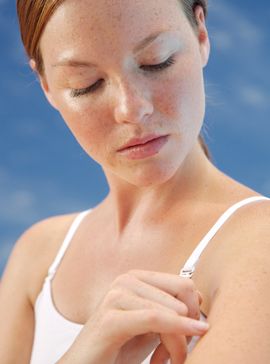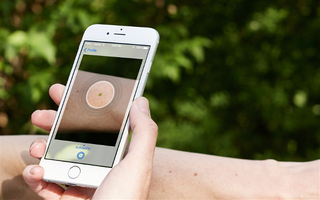A Mobile App Helped To Diagnose A Woman's Skin Cancer After A Doctor Initially Turned Her Away

Checking our moles and any unusual features on our skin is something we're all tasked with doing regularly. After all, we're always told that staying vigilant and investigating any strange features could help to make the difference if you're given a diagnosis of skin care.
However, while it's something we ordinarily go to the doctor for, one woman decided to use the help of an app.
Skin Vision, a skin cancer tracking app, is said to be a ‘clinically proven' way of helping to investigate seemingly suspect moles.
One 39-year-old woman, Natalie Killian, turned to the app after noticing a strange-looking spot on her chest. You use the app to take a picture of the concerning area, and it then ranks the photo into low risk, medium risk, and high risk.
Low risk means there's nothing concerning in the photo, a medium risks encourages you to keep an eye on the area for changes, while a high risk states that you should visit your doctor immediately.
Natalie's photo showed a medium risk - so she decided to book an appointment. However, on arrival, the doctor declared that the spot was nothing to worry about.
Later on in the year though, the app again notified Natalie to get the mole checked. Given the doctor's reassurances, she initially ignored the message, but after noticing a sharp pain in the area as well, she went again to the doctors to get the mole investigated.
Sign up for the woman&home newsletter
Sign up to our free daily email for the latest royal and entertainment news, interesting opinion, expert advice on styling and beauty trends, and no-nonsense guides to the health and wellness questions you want answered.
"I had been sent quite a few messages by the SkinVision team, but thought that my GP must know better than my phone," she said.
"Then I started getting intermittent sharp, needle-like pains and it started to itch so I decided to seek a second opinion."
Throughout the year, Natalie had also been collecting images of the affected area, in order to monitor how it may be changing.

And it was that that helped the doctor to diagnose Natalie, who was eventually told on her second visit that she needed an urgent referral to a dermatologist.
She was then told she had a basal cell carcinoma, one of the most frequently occurring types of skin cancer in the world.
Speaking to the Express, Natalie confessed that while her doctor officially diagnosed the cancer, the app was invaluable in helping to prove how it had changed after the months.
"I was able to show them the changes I had seen using the photos saved on the app. The app definitely helped me to keep track of changes in my skin. "
But while the app did prove useful in this instance, an expert at the British Heart Foundation, Dr Anjali Mahto, warned that it's best to be cautious when using this kind of technology.
"While they have potential usefulness for education, patient risk assessment and monitoring of moles, at this point in time there is no substitute for a full skin examination by a consultant dermatologist."
If you notice a change in your skin, it's always best to first head to a doctor or dermatologist and get the area checked out. But keeping a note of any changes on your skin certainly seems like a good idea to us too.
Amy Hunt is an experienced digital journalist specialising in homes, interiors and hobbies. She began her career working as the features assistant at woman&home magazine, before moving over to the digital side of the brand where she eventually became the Lifestyle Editor up until January 2022. Amy won the Digital Journalist of the Year award at the AOP Awards in 2019 for her work on womanandhome.com.
-
 Caught ending explained: Who was the killer and is Leo dead?
Caught ending explained: Who was the killer and is Leo dead?Another Harlan Coben thriller is riding high on Netflix, and viewers are asking for a deep dive of the intense ending of Caught
By Lucy Wigley Published
-
 Chocolate brown is everywhere but Ranvir Singh's Reiss sale dress stands out from the crowd
Chocolate brown is everywhere but Ranvir Singh's Reiss sale dress stands out from the crowdRanvir Singh has made us fall in love with deep cocoa brown all over again and her Reiss midi dress is more than 50% off
By Emma Shacklock Published

